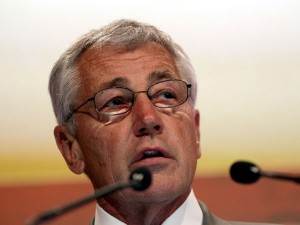US defence chief accuses China of cyber spying

U.S. Defense Secretary Chuck Hagel delivers his keynote address on “The US Approach to Regional Security” at the International Institute for Strategic Studies Shangri-la Dialogue, or IISS Asia Security Summit, Saturday, June 1, 2013 in Singapore. AP
SINGAPORE—US Defense Secretary Chuck Hagel on Saturday accused China of waging cyber espionage against the United States, raising pressure on Beijing over the issue ahead of a key summit between their leaders.
The Pentagon chief, speaking at a Singapore security forum attended by senior Chinese military officials, pointedly blamed the Chinese government and armed forces for repeated intrusions into sensitive US information systems.
“The United States has expressed our concerns about the growing threat of cyber intrusions, some of which appear to be tied to the Chinese government and military,” he told an annual conference known as the Shangri-La Dialogue.
Hagel pressed Beijing to adhere to “international norms of responsible behavior in cyberspace,” while acknowledging that the establishment of a joint cyber security working group was a positive step in fostering dialogue.
The Singapore forum came ahead of the June 7-8 meeting between US President Barack Obama and his Chinese counterpart Xi Jinping in California, the two leaders’ first meeting since Xi took office in March.
China’s delegation to the Singapore meeting was led by Lieutenant General Qi Jianguo, a deputy chief of the general staff of the People’s Liberation Army.
Hagel’s remarks came just days after China’s defense ministry dismissed a Pentagon report released in May accusing Chinese hackers of accessing US weapons designs.
“First they underestimate the security defense capabilities of the Pentagon and second they underestimate the intelligence of the Chinese people,” it said.
The report was the most explicit statement yet from Washington that it believes China’s cyber spying is focused on the US government and corporations.
In his speech, Hagel insisted that Washington’s military “rebalance” towards Asia-Pacific — a policy announced at the same forum last year by his predecessor Leon Panetta — will not be affected by cuts in US military spending.
He said the US Air Force had allocated 60 percent of its overseas-based forces to the region including tactical aircraft and bombers.
Hagel added that 2,500 US Marines will eventually be deployed to Australia each year as part of the effort.
Last year, Washington announced a major naval deployment to Asia, including the rotation of up to four Littoral Combat Ships — newly developed vessels designed for coastal operations — to Singapore, a staunch US supporter.
Hagel said Washington remained concerned “over the potential for dangerous miscalculations or crises” arising from competing territorial claims in Asia.
“The United States stands firmly against any coercive attempts to alter the status quo,” he said, urging claimant nations to settle disputes peacefully and in a manner that adheres to international law.
Hagel announced that he was inviting his counterparts from the 10-member Association of Southeast Asian Nations (Asean) to a meeting in Hawaii next year, which would be the first such meeting hosted by the United States.
Four of Asean’s 10 member states — Brunei, Malaysia, the Philippines and Vietnam — are locked in territorial disputes with China.
But smaller Asean member countries like Laos and Cambodia appear to have come under increasing Chinese economic and political influence, partly as a result of foreign aid from Beijing.
Hagel also used the Singapore conference to reaffirm Washington’s defense treaty with its former colony the Philippines, which has been the most vocal opponent of Chinese territorial ambitions in the West Philippine Sea (South China Sea).
The Philippines and the United States, whose soldiers fought side by side in the Pacific theater during World War II, are bound to help defend each other in case of external attacks under a mutual defense treaty signed in 1951.
For comprehensive coverage, in-depth analysis, visit our special page for West Philippine Sea updates. Stay informed with articles, videos, and expert opinions.